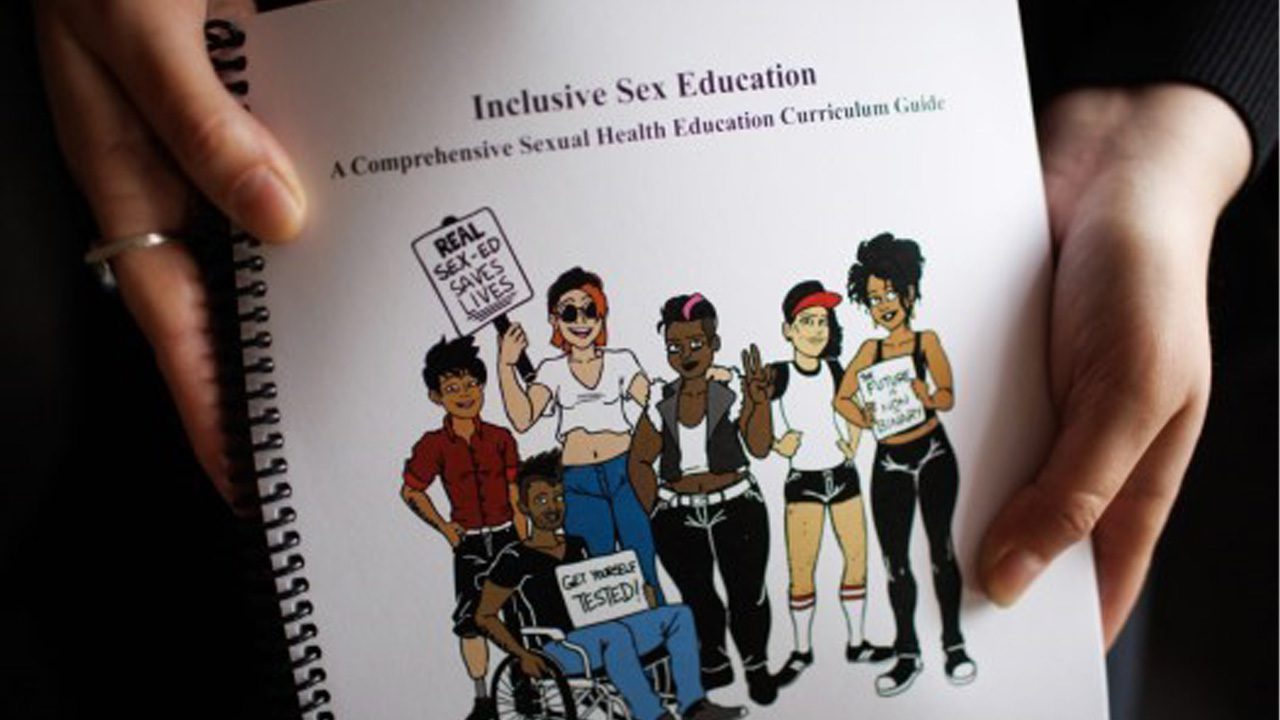
How high school sex-ed has become a new culture war flashpoint
Orlando Sentinel | By Gillian Dohrn | February 6, 2024
Pushback against classes that discuss LGBTQ+ issues is growing, even in progressive bastions
In high school, Jamie Cutter sat through lectures on abstinence in a city that had one of the highest rates of teen pregnancy in California. Nearly two decades later, she teaches the sex-ed class she wishes she’d taken back then.
Sitting at her desk in a bright and breezy classroom tucked away on the Delta High School campus in the Santa Cruz County town of Aptos, Cutter wears a purple T-shirt emblazoned with the word “Queer.” She is an out-and-proud educator, but it wasn’t her sexual orientation that inspired her to focus on this work. She wrote “Inclusive Sex Education,” a curriculum for high school students, and has been teaching it for the past 10 years because she saw firsthand what happens without it.

The 16-week course goes beyond basic sex-ed, covering issues such as mental health, risk reduction, and drug and alcohol prevention. Cutter strives to give her students something she never got in high school — facts and the freedom to question.
For nearly a decade, Cutter’s curriculum spread through schools without controversy. But with the politicization of sexual orientation and gender identity in America, some parents are now objecting. Even in Santa Cruz, a liberal haven in a deep blue county, inclusive sex education is becoming divisive.
“It’s not like there is suddenly an increase in queer identities just because of learning about it in school,” Cutter said. “And then, unfortunately, that becomes a political issue for some folks and it turns into a left-versus-right thing.”
Even at her own high school in Santa Maria, on the southern end of California’s Central Coast, back in the mid-2000s, Cutter became a covert sex educator for fellow students who were poorly served by an abstinence-based curriculum. Cutter’s mom, who was a nurse, taught her the ins and outs of sexual health at home.
“I found myself teaching my friends how to use condoms and telling people where Planned Parenthood was,” Cutter said. “That was something the teachers could not say anything about.”
The experience inspired Cutter to write her own curriculum when, in 2013, she took over as the sex-ed teacher at Delta — a charter high school for kids who haven’t found success in traditional classrooms.
Cutter didn’t think her curriculum was all that revolutionary when she wrote it. She simply looked at the state standards and planned lessons to satisfy them. But even students who had taken sex-ed classes elsewhere said a lot of the material was new to them.
“Every question in this class is valid,” said Sion Erkiletian, a junior at Delta High School who identifies as nonbinary. “This is a space we’re allowed to be vulnerable, and you’re also allowed to be confused.”

The curriculum began to spread in 2014 after Cutter started working with the Safe Schools Project, a Santa Cruz County resource group for queer youth and educators. With a grant from the Community Foundation Santa Cruz County, they developed a curriculum guide and trained local teachers on implementation. The third edition came out in 2022.
Since its debut, teachers and school districts throughout California, in Oregon and as far away as Amsterdam have purchased Cutter’s curriculum. She has trained teachers at seven local schools and the Pajaro Valley Unified School District has adopted it as its official curriculum.
“Jamie loves to disrupt the system to better meet the needs of her students,” said Ryane Ortiz, a teacher at Aptos High School who received sex educator training from Cutter in 2018. “When I met her, I was immediately inspired and captivated by her will to do what is right by our students and our community.”
Since 2016, the California Healthy Youth Act has required high schools across the state to teach comprehensive sex education and HIV prevention, inclusive of gender identity and sexual orientation.
Most schools offer a curriculum night before the school year starts where parents can review the curriculum and ask questions. Historically, this was not well attended at Aptos, Ortiz said. When they started holding the meetings virtually during the pandemic, attendance increased, and apprehension did, too. Online learning gave parents new insight into their children’s classes, and some were concerned by what they saw.

“The main topic every time, every year, is parents being cautious or wary or just not wanting their child to learn about queer/trans identities,” Ortiz said.
“I have been hearing that parents are wanting to opt their kids out of just the ‘gay stuff,’” Cutter said. But state law doesn’t permit schools to teach units within a curriculum selectively. So Cutter tells concerned parents that this unit does not include any information on sexual acts. She teaches it because all students have a sexual orientation and gender identity, and they need to know what that means.
Cutter also reminds parents that studies show that comprehensive sex education delays the onset of sexual activity and helps prevent unintended consequences, including pregnancy.
Most parents have accepted this explanation, Cutter said. But as gender and sexuality have joined previous flashpoints like COVID restrictions and racial politics in the culture war spotlight, opposition has become more organized.
“For a long time, it was the masks, then it was critical race theory, then it was social-emotional learning,” said Tracy Henderson, founder of the Monterey-based organization California Parents United, one of the groups calling for more parental control. “Now the hot topic, if you will, is the trans, gender identity, gender-affirming stuff they’re pushing in our schools.”
“We need to go back to just math, English, writing,” Henderson said.
In September, Henderson joined representatives from other local parents’ rights organizations — including the high-profile, and recently scandal-embroiled, national right-wing advocacy group Moms for Liberty, at a gathering in Watsonville. Speakers denigrated inclusive sex education, criticized legislation and raised concern about explicit references in literature. Although fewer than 100 people attended, this event was the first of its kind in Santa Cruz.
One speaker, Dalila Epperson, is running as a Republican to represent District 30 in the state Assembly, covering most of the Central Coast from Santa Cruz to Pismo Beach. Her campaign is focused around parents’ rights to choose what their children learn.
“Our representatives just aren’t listening to their constituents any longer,” Epperson said. “That’s why I’m running.”
While Epperson has little chance of unseating incumbent Dawn Addis, a Democrat, Cutter is concerned about the impact of controversies around LGBTQ+ issues and inclusive sex education in schools.
“I know it’s having an effect on teachers, because teachers feel anxious about what parents are going to accuse them of next,” Cutter said.
In November of 2021, two teachers at Buena Vista Middle School in Salinas in Monterey County were accused in an online newsletter of “efforts to subvert parents” on kids’ gender identities and sexual orientation, after they gave a presentation on running the school’s gay-straight alliance at the California Teachers Association’s annual LGBTQ+ Issues Conference. Both teachers were cleared of wrongdoing by an independent law firm hired to investigate by the Spreckels Union School District, but have since resigned from their roles.
Epperson was among those who spoke out against the teachers at a charged board meeting of the Spreckels district, shortly after the issue blew up. The district was later sued by a parent who claimed the two teachers had “transitioned” her daughter, and settled the case in June for $100,000.
Despite the growing controversy around teaching about gender and sexuality, students like Samantha Younggren, a senior at Delta High School, remain strong supporters of Cutter’s curriculum.
“I’m glad we’re learning more than just how to prevent pregnancy,” Younggren said. “Jamie’s sex ed class totally changed the way I view a lot of things.”





